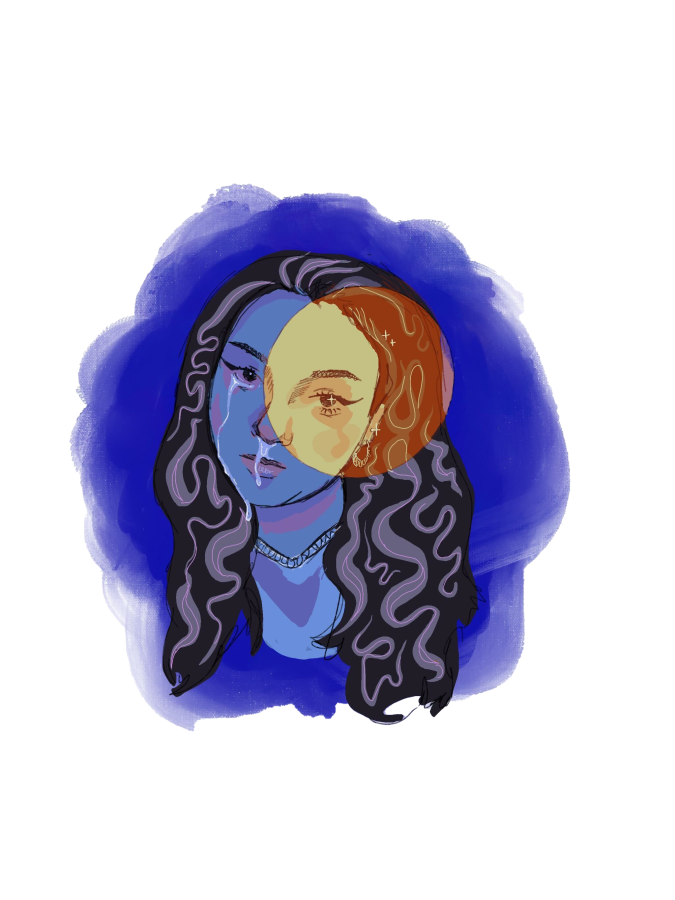As junior Gabriela Hakeman scrolls through Instagram, posts about mental illnesses come across her Explore and Home pages. Her experience is not uncommon.
Social media platforms have become a haven for mental illness-based posts, but Hakeman said the accessibility of posting about mental health on social platforms has advantages and disadvantages.
“I’ve seen people sharing their experience and showing people what it’s really like to struggle with mental illnesses,” Hakeman said. “But I’ve also seen people that glorify having mental illness or having certain behaviors, showing the glorified versions as OK and normal when (they) shouldn’t be.”
Hakeman also said glamorizing mental illnesses, especially on platforms with users who desire to be different, leads people to treat mental illnesses as desirable personality traits.
“They think, ‘Oh my God, I’m so OCD; I’m organizing all this stuff,’ or ‘I have PTSD from the test I had last class,’” Hakeman said. “I’ve heard about people trying to act like they have these issues just to get more attention from the people around them.”
Posters who glamorize mental illnesses on social media can create negative stereotypes, Hakeman said.
“Social media has played into some stereotypes about mental illness; for instance, people with depression always seem sad or people with eating disorders are always underweight,” Hakeman said. “It can also make people feel like they can’t reach out for help because they don’t have it as bad as somebody else.”
These superficial stereotypes can become widespread across platforms and create an environment of self-diagnoses.
And Wellness Outreach Coordinator Shely Benitah said in an email that when these stereotypes are the only symptoms associated with mental illnesses, people may find themselves in a paradox of inspection.
“There are downsides to romanticizing mental illness and self-diagnosis that can lead to misdiagnosis and mistreatment,” Benitah said.
Even though social media can perpetuate negative stereotypes about mental illnesses, the platforms can also serve to spread awareness about both the negative and positive aspects of it.
Hakeman said well-researched information can be helpful in de-stigmatizing mental illnesses.
“Posts about what people can do to help others that are struggling with mental illness, how to cope with mental illness or even just knowing the signs of certain conditions can be really helpful,” Hakeman said.
While junior Miya Whiteley agrees, she said people should still be aware of the risks associated with trusting everything they see on social media.
“Awareness posts can make it easier for people to get more knowledge about different issues, but we have to make sure that those posts are actually credible, because otherwise, it could be misinformation,” Whiteley said.
While posting about mental illness on social media can result in misinformation, the rise in communication of mental health is ultimately valuable because Benitah said it allows users to be able to relate to one another.
“Social media can be helpful to connect with other people who share similar life experiences, and, as a result, people can feel less alone,” Benitah said. “Social media has the potential to help de-stigmatize talking about mental health and encourage help-seeking behaviors.”
Communicating online about personal struggles can also be easier than talking face-to-face.
“Mental health, no matter how much we talk about it at school, is still extremely stigmatized,” Hakeman said. “To say you struggle with depression or an eating disorder is not something people come out and say to everyone. Having these platforms and support groups that know what you may be going through can be extremely helpful, especially when you may not have people in your local community that have the same struggles.”
Although the communal aspect of social media can be helpful, Whiteley said the conversations within them can potentially be harmful.
Whiteley also said there is a difference between relating with other people and dismissing the struggles people live through.
“People will make jokes to help themselves through something, which is fine, but when mental health is repeatedly used as a joke, that’s when it becomes a problem,” Whiteley said.
According to Hakeman, creating a space for people with mental illnesses to interact also increases the risk of further stigmatizing mental illnesses because insensitively sharing mental health journeys can lead to dangerous competitive mindsets.
“Sharing triggering things quickly becomes a competition,” Hakeman said. “If somebody with an eating disorder shares their lowest weight or how many calories they’re consuming, or how many times somebody with depression has ended up in the hospital, it becomes a competition of who is the most ill.”
While social media can both promote wellness and recovery and romanticize mental illnesses, Benitah said it is important to step back once in a while. She encourages everyone to to reflect about the effects of social media and the way it depicts of mental illnesses and be aware of the effects posts are having on those who see them.
“Each person is unique, and the information on social media is not one-size-fits all,” Benitah said. “At the end of the day, it’s important to know that when something is impacting your quality of life, it’s OK to seek support from resources or trusted adults.”


Faraz • Feb 23, 2023 at 8:11 am
Social media can have a positive impact on mental health when used responsibly. On the other hand, it can also have a negative effect on mental health when used irresponsibly. It is important to be aware of how our social media use can affect our mental health, and to take steps to ensure our use of social media is beneficial for our mental wellbeing. You can also check this blog post The effect of social media on mental health for more information.
https://yourmentalhealthpal.com/social-media-affects-mental-health/